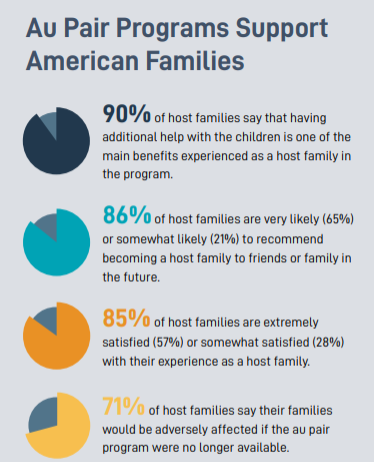AuPairCare has been operating the au pair cultural exchange program with guidance from the Department of State for over 30 years. We believe in the mission of the au pair cultural exchange program and its benefits to all its participants. The au pair program has a robust set of comprehensive federal regulations, including limits on working duties, hours, minimum stipend payments, paid vacation time, and time off. These are important requirements that both families and au pairs must abide by in order to participate in the program.
Even though au pairs are part of a federal cultural exchange program, there are some groups that believe au pairs should be included in the definition of a domestic worker and be subject to state and local labor laws in addition to federal regulations. In December 2019, the U.S. Court of Appeals covering Massachusetts ruled that the federal au pair regulations do not preempt state and local laws. The effect of that holding was to weaken the federal regulations of the au pair program, thereby enabling other states and localities to attempt to reclassify this federal cultural exchange program into a domestic workers program. Some localities with pending domestic worker bills are still deciding if au pairs should be included in their definition of a domestic worker. If left unchecked, these efforts will undermine the federal au pair program’s public diplomacy mission because of inconsistencies in disparate state and local laws, directly regulating participants of this inherently Federal cultural exchange program.
AuPairCare supports the U.S. Department of State reaffirming that its federal regulations preempt state and local laws. The U.S. Department of State was very clear in the Administration’s 2018 Amicus Brief declaring “the Federal au pair regulations do not leave room for a state or municipal government to impose terms of employment for au pairs that differ from the terms set forth in the regulations." Recently, the U.S. Department of State released a further statement on April 30, 2021, a Notice of Proposed Rulemaking (NPRM), which states its intent to publish new proposed regulations for the au pair program in the near future that would specifically address the preemption of federal law over state and local laws in regards to au pair wage standardization.
The prior Administration’s Spring 2020 regulatory agenda included a proposed rule regarding au pair federal regulations preemption of state and local law. We appreciate the U.S. Department of State’s strong support of the au pair program as an international cultural exchange program administered exclusively by the federal government and their continued vigilance in clarifying the federal regulations.
The sponsor community has been working together with the Alliance for International Exchange to educate state and local legislatures on the importance of the au pair program and all the current program regulations and processes in place to ensure the health, safety, and welfare of all program participants.
Host Families and advocates of the au pair cultural exchange program can contact the U.S. Department of State at [email protected] and express the need for updated regulations which clarify that the Federal Regulations of the au pair program pre-empt state and local law. You can also contact your local house representative and/or senators to have your voice be heard.

- Au pairs are part of BridgeUSA, a federal cultural exchange program, regulated and overseen by the U.S. Department of State for more than 30 years. The goal of the au pair program is to advance U.S. diplomacy goals by creating meaningful relationships between young people from other countries and Americans.
- Au pairs receive full room and board, a private bedroom, a weekly stipend, and an educational allowance. They support the host family by providing limited childcare. The U.S. Department of State calculation of the minimum weekly stipend is based on the federal minimum wage with a 40% deduction for room and board. Host families and au pairs are free to agree to compensation higher than the legally applicable minimum. The decision is up to each individual family and au pair.
- The U.S. Department of State requirements include but are not limited to: on-call support, orientation for host families and au pairs, pre-program home visits, insurance for au pairs, monthly personal contact with a local representative, daily and weekly limitations for on duty hours, responsibilities limited to childcare only, minimum 1.5 days off per week, and two weeks of paid vacation.
- During their paid vacation and required time off, au pairs explore their local communities and destinations throughout the U.S. Au pairs also fulfill an educational component as a requirement of the program.
